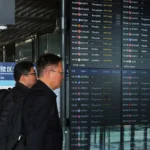
Donald Trump promises to revitalize the economy with his “economic vision”, but economists warn that protectionism could overshadow benefits and harm global growth
Donald Trump’s vision to reshape the world’s largest economy through protectionist policies that put “America first” will hurt growth, according to research by the Financial Times with economists, who contrast with investors’ optimism regarding the US president-elect’s plans.
Surveys of more than 220 economists in the US, UK and Eurozone on the economic impact of Trump’s return to the White House showed that most respondents believe his protectionist turn will overshadow the benefits of other elements of what the president-elect has called “Maganomics”.
Many economists in the US, interviewed jointly by FT and the University of Chicago Booth School of Business, also believe that a new Trump term will stimulate inflation and lead the Federal Reserve to be more cautious in reducing interest rates.
“Trump’s policies may bring some growth in the short term, but that will be at the cost of a global slowdown that will eventually hurt the U.S.,” said Şebnem Kalemli-Özcan, a professor at Brown University and a member of the Fed’s economic advisory panel. New York. “His policies are also inflationary, both in the US and in the rest of the world, which will lead us to a scenario of stagflation.”
However, most economists — including those at the IMF, OECD and European Commission — predict stronger growth in the US than in Europe by 2025.
Since the coronavirus pandemic, the US economy has consistently outperformed its European counterparts, growing at an annualized rate of 2.8% in the third quarter of last year.
Trump has yet to present a comprehensive economic plan, leaving analysts to base their forecasts on promises and threats made during the campaign. These include plans to impose tariffs of up to 20% on all US imports, mass deportations of undocumented workers, regulatory cuts and the continuation of tax cuts introduced in 2017.
Trump, a self-described “tariff man,” has long believed the U.S. needs to close its trade deficit and increase domestic production.
“The announced policies include substantial tariffs and deportations of immigrant workers,” said Janice Eberly, a former senior U.S. Treasury official in the Obama administration who is currently at Northwestern University. “Both tend to be inflationary and probably negative for growth.”
More than half of the 47 economists surveyed specifically about the U.S. economy expect “some negative impact” from Trump’s agenda, while another 10% predict a “major negative impact.” On the other hand, a fifth of those interviewed expect a positive impact.
Economists’ pessimism contrasts with investors’ optimism regarding Trump’s second term.
The US S&P 500 index soared in the weeks following Trump’s victory, although it gave back some of those gains in December after the Federal Reserve signaled it would make fewer interest rate cuts this year than expected.
In its best two-year performance this century, the benchmark index ended 2024 up 23.3%, following a similar gain in 2023.
Bank of America strategist Benjamin Bowler said this week that Trump’s “laissez-faire economics, tax cuts and deregulation” combined with a potential “AI revolution” indicate the bull market is likely to continue into 2025.
A separate survey of the FT showed that Eurozone economists are even more pessimistic about the impact of Trump’s policies on the region than their US counterparts. Around 13% of analysts expect a large negative effect, and another 72% predict negative repercussions.
For the Eurozone, the main concern is with industrial production, especially in Germany, the region’s largest economy.
Martin Wolburg, senior economist at Generali Investments, highlighted that the country’s auto industry could be “especially targeted” by Trump.
Trump’s threat of a 60% tariff on China “could further challenge European industries,” said Christophe Boucher, chief investment officer at ABN Amro Investment Solutions, by raising the possibility of Beijing flooding the region with cheap goods.
Although the UK is better protected from tariffs due to its large services sector, Alpesh Paleja, chief economist at the CBI, warned that the country would be exposed to a “second-round impact” if tariffs weigh on Eurozone growth. .
In the UK, more than 56% of almost 100 respondents expect some negative impact, with many citing the slowdown in sentiment caused by the climate of uncertainty ahead of Trump’s inauguration on January 20. Just over 10% foresee some positive impact.
“The Trump administration will be an ‘unpredictability machine’ that will discourage businesses and households from making long-term decisions easily,” said Barret Kupelian, chief UK economist at PwC. “This will inevitably have an economic cost.”
Source: https://www.ocafezinho.com/2025/01/02/economistas-preveem-sombra-do-protecionismo-na-era-maganomics/

